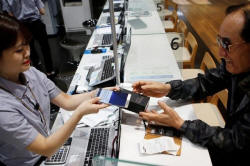|
Samsung offers financial
incentives to stem Note 7 bleeding
 Send a link to a friend
Send a link to a friend
 [October 13, 2016]
By Hyunjoo Jin [October 13, 2016]
By Hyunjoo Jin
SEOUL
(Reuters) - Samsung Electronics on Thursday offered financial incentives
for U.S. and South Korea customers who exchange Note 7s for other
products or refund them, as the tech giant scrambles to shore up its
reputation in the wake of a damaging safety crisis.
The consumer electronics company is also expanding a U.S. recall of the
fire-prone model to a total 1.9 million Note 7 phones, which includes
the 1 million Galaxy Note 7s it recalled on Sept. 15.
The South Korean giant is in damage-control mode as rivals like Apple
Inc and LG Electronics try to steal market share from the global
smartphone leader after it was forced to scrap its latest high-end
device.
Samsung is boosting its marketing and promotional efforts around other
Galaxy-series smartphones to cushion the blow from the demise of the
premium Note 7, which it finally abandoned this week after failing to
resolve overheating problems which caused some of the phones to ignite.
Samsung said on Thursday it is offering up to $100 in bill credit to
consumers who exchange their Note 7s for any Samsung smartphone in the
U.S.
U.S. customers who exchange their Note 7s for a refund or other branded
smartphone will receive $25 in bill credit.

"We appreciate the patience of our consumers, carriers and retail
partners for carrying the burden during these challenging times," said
Tim Baxter, president and chief operating officer, Samsung Electronics
America.
"We are committed to doing everything we can to make this right."
The U.S. Consumer Product Safety Commission said on Thursday the Note
7's "battery can overheat and catch fire, posing serious fire and burn
hazard to consumers."
It added that Samsung has received 96 reports of batteries in Note 7
phones overheating in the U.S., including 23 new reports since the Sept.
15 recall announcement.
In the U.S., Samsung began sending fireproof boxes and protective gloves
to customers returning potentially explosive Note 7s, drawing humorous
barbs from social media commentators.
The company has commenced offering similar financial incentives in its
home market of South Korea, which it says would compensate consumers for
their "big inconvenience."
After days of heavy losses, Samsung's shares ended 1.4 percent higher on
Thursday while the broader market fell 0.9 percent.

[to top of second column] |

A customer exchanges his Samsung Electronics' Galaxy Note 7 to
Galaxy S7 at company's headquarters in Seoul, South Korea, October
13, 2016. REUTERS/Kim Hong-Ji

On Wednesday, the firm slashed its quarterly profit estimate by $2.3
billion to reflect the impact of the Note 7 withdrawal, giving some
investors hope that the financial cost of the debacle had been largely
accounted for.
"We are confident the 3Q 16 re-statement puts to bed the direct
financial impact of the Note 7 recall and termination," UBS said in a
report.
"In the near-term, we believe investors will re-focus on shareholders
returns ahead of full 3Q results Oct 27th."
NOKIA, BLACKBERRY
Customers will have plenty of choice in the weeks ahead, with South
Korean mobile carriers including SK Telecom planning to take pre-orders
for Apple's iPhone 7 starting Friday. LG Electronics also recently
launched its V20 smartphone.
Many analysts say the real risk to Samsung lies in the reputational
damage it suffers in a cut-throat industry rather than financial costs.
"Industry experience, such as the decline of Nokia and BlackBerry, shows
how successful manufacturers can lose market share particularly quickly
in the handset business," Fitch ratings agency said in a report on
Thursday.
Moody's also said in a report that day that the Note woes are "credit
negative" and "threaten to have a more lasting negative effect on the
Samsung brand and would require significant marketing expense to regain
consumer confidence."
Meanwhile, South Korea's central bank said the Note 7 failure could
undermine economic growth, although it needed more time to assess the
effects.
(Editing by Stephen Coates and Sam Holmes)
[© 2016 Thomson Reuters. All rights
reserved.] Copyright 2016 Reuters. All rights reserved. This material may not be published,
broadcast, rewritten or redistributed.
 |